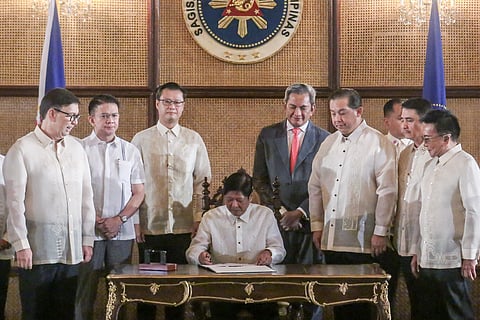
- NEWS
- the EDIT
- COMMENTARY
- BUSINESS
- LIFE
- SHOW
- ACTION
- GLOBAL GOALS
- SNAPS
- DYARYO TIRADA
- MORE

President Ferdinand Marcos Jr. on Wednesday signed Republic Act 12023, or the Value-Added Tax (VAT) on Digital Services Law.
Under the new measure, a 12-percent VAT will be imposed on non-resident Digital Service Providers (DSPs) in digital media, digital music, digital video, video-on-demand and digital advertising.
This includes popular streaming giants such as Netflix, Disney+, Amazon Prime Video, HBO, Spotify and YouTube, among others.
According to Marcos, the new law will help bridge gaps in the Philippine tax system.
“If your presence in the Philippine market is as real as your profits, then your tax responsibilities should also be equally tangible,” he said.
Marcos explained that the government is not imposing new taxes but is “simply strengthening” the authority of the Bureau of Internal Revenue (BIR) and streamlining its process for collecting a value-added tax on digital services.
He noted that local businesses and international digital platforms will now be competing on equal footing.
“If you are reaping the rewards of a fruitful digital economy here, it is only right that you contribute to its growth,” Marcos said.
“After all, whether you are a small tech startup or a global tech giant based halfway around the world, if you are making money in the Philippines, you are part of our community,” he said.
The BIR will take the lead in implementing the new law.
Marcos said the government has taken a deliberate and measured approach to the new tax to ensure it does not stifle innovation or hinder growth.
“This law is more than ensuring tax compliance, it is also in support of nation-building,” he said.
BIR Commissioner Romeo Lumagui Jr. said the signing of RA 12023 marks a significant milestone for the Philippines. He noted that local DSPs have borne the VAT burden while their foreign counterparts profited from consumers for years.
Fair competition
“This law promotes fair competition, ensuring that both local and foreign DSPs compete on an equal footing. In doing so, we create a more competitive marketplace where consumers will ultimately benefit from improved services and fairer pricing,” Lumagui said.
In the next five years, the government expects to collect P105 billion with the new law, which could fund the building of 42,000 classrooms, more than 6,000 rural health units, and 7,000 kilometers of farm-to-market roads.
Economist-lawmaker Joey Salceda, one of the principal authors of the bill, believes the new law will generate at least P8 billion to P12 billion, or possibly more, in its first year. He noted that the law will also introduce a 5-percent earmark for 10 years, allocated to the creative industry — one of the country’s most potent sources of growth.
The allocation will help fund programs for creative industries, particularly for freelance workers such as actors, writers, singers, dancers, composers and directors. It would ensure that the industry continues to thrive and contribute to the economy.
“The Philippine creatives sector — artists, artisans, producers — are the biggest winners with this law,” Salceda, chair of the House Committee on Ways and Means, said.
Moreover, he emphasized that the law will end the longstanding “unfair treatment” of local creatives, who pay taxes while foreign companies sell their products tax-free.
“This meant that our local creatives sector was competing with their hands tied behind their backs while foreigners had full access to our market,” he said.
He added, “The 12-percent difference in treatment is no small matter. Before this law, it meant that foreign creatives in the digital space could be sold cheaper than their domestic competitors.”
Whether foreign digital service providers opt to sell their products through local partners — which would allow them to charge local expenses as input tax — is still a win-win for the Philippines, as it will generate jobs for local affiliates, according to Salceda.
VAT exemption
Digital services used for educational purposes, including online courses, online seminars and online training conducted by private educational institutions accredited by the Commission on Higher Education (CHEd), Department of Education (DepEd) and the Technical Education and Skills Development Authority (TESDA), are exempt from VAT.
“The sale of online subscription-based services, such as Zoom and Google Classroom, to DepEd, CHEd, TESDA and government educational institutions are also exempt, as are the services of banks and non-bank financial intermediaries,” said DoF Director Nina Asuncion.
Meanwhile, the BIR will block the websites or platforms of Digital Service Providers who do not comply with the new measure. Penalties and surcharges will also be imposed on DSPs.
“We will issue a revenue regulation on how they should report to us. We will be able to see their sales easily because when we go to their platforms, we will see their transactions,” Lumagui said.
